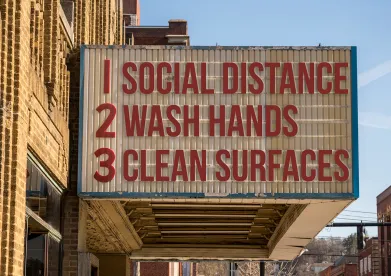New initiatives and some promising developments in vaccine trials, contact tracing efforts, and the production of more efficient COVID-19 detection testing highlighted an active week in the scientific community’s response to the COVID-19 pandemic. Meanwhile, in the same week that New York City announced three straight days with zero COVID-19-related deaths — along with a raft of more stringent travel policies — states continue to roll out their own COVID-19 response strategies and initiatives.
Encouraging COVID-19 Vaccine Development
There were promising results in the Phase I clinical trial of an experimental COVID-19 vaccine developed by Novavax. The participants were given either a placebo or one of four doses of the vaccine. Those injected with two injections three weeks apart were noted to have the best response with relatively mild side effects. The Phase 1 data illustrate a vaccine candidate with robust immunogenicity profile, the key characteristic of a vaccine's ability to induce an immune response. The United States government awarded Novavax $1.6 billion to complete Phase II clinical trials, late-stage clinical development, and large-scale manufacturing and delivery of the vaccine.
New York City Travel Policies
In the earlier months of the pandemic, New York City was the epicenter of the pandemic in the United States, with New York having nearly half of the United States cases and with more than half of those cases being from NYC alone. On Tuesday, New York Governor Cuomo announced no COVID-19 related deaths reported for three straight days. Though this streak was broken on Wednesday, the five city boroughs have some of the lowest positivity rates in the country. Despite the promising news, strict, mandatory 14-day quarantine guidelines have been put in place for visitors coming from 35 identified states. Physical checkpoints and penalties have been established in the hopes to continue the downward trend. Though great strides have been made throughout the country, recent reports say over the last seven days, one person has died every 80 seconds from COVID-19 in America.
Virginia to Use COVID-19 Tracing App
Virginia will be the first state to use a new COVID 19 tracing application called Covidwise, available on both Android and iPhones. When a person tests positive for COVID 19, the individual can opt-into the program allowing other users of the app to be notified of potential exposure. It was emphasized that the identity of the person who tested positive is kept anonymous, participation is 100% voluntary, and no location tracking technology (i.e., GPS) or personal information is collected. The app uses Bluetooth, which is a short-range signal to determine if you (via your phone’s proximity to other phones) have spent 15 minutes or more within six feet of someone who has tested positive for COVID 19.
States Buying Rapid COVID-19 Tests
Six states — Maryland, Louisiana, Massachusetts, Michigan, Ohio and Virginia — will each purchase 500,000 tests from manufacturers Becton Dickinson and Quidel. Due to delays in the federal government supplying states with adequate testing, states have come together to reduce their reliance on overworked commercial labs. Though rapid testing kits are not always the best option due to lesser accuracy, they deliver results within 15 to 20 minutes, which can hopefully detect outbreaks quicker.
NIH Funds Better Test Development
The National Institutes of Health’s (NIH) Rapid Acceleration of Diagnostics (RADx) effort has recently given contracts to seven companies to develop SARS-CoV-2 detection tests. Four are lab-based and three are point-of-care. The RADx effort is seeking to fund new detection technologies and approaches that, e.g., significantly enhance turn-around time for results, increase throughput, or provide and facilitate more convenient sampling. Some are incorporating newer technologies, such are CRISPR and microfluidics. Several other companies are in the review pipeline for funding. The immediate objective of this initiative is to make available several millions of tests per week by the fall.
Origin of SARS-CoV-2 Believed to Have Been Circulating in Bats for Decades
Taking a multi-pronged approach, a team of U.S., Chinese and European researchers have reconstructed the evolutionary history of SARS-CoV2. SARS-CoV2 is a member of the subgenus Sarbecovirus whose genomes are derived from multiple sources through recombination (i.e., genetic rearrangement). Utilizing three different bioinformatics/computational approaches, researchers were able to identify the recombinant regions within the virus’s genome and isolate those non-recombinant/constant regions which share a common evolutionary origin. By comparing the non-recombinant regions of SARS-CoV-2 with other bat viruses, it is estimated that the virus lineage that gave rise to SARS-CoV-2 arose approximately 40-70 years ago. From the study’s results, it was concluded that while pangolins may have acted as an intermediate viral host providing a reservoir for transmission to humans, the virus appears to have developed the ability to replicate in the upper respiratory tract of both humans and pangolins via recombination in bats. The study’s findings suggest similar viruses capable of infecting humans are likely circulating in bats, and have implications for responding to and possibly preventing future pandemic resulting from this virus lineage.








 />i
/>i

